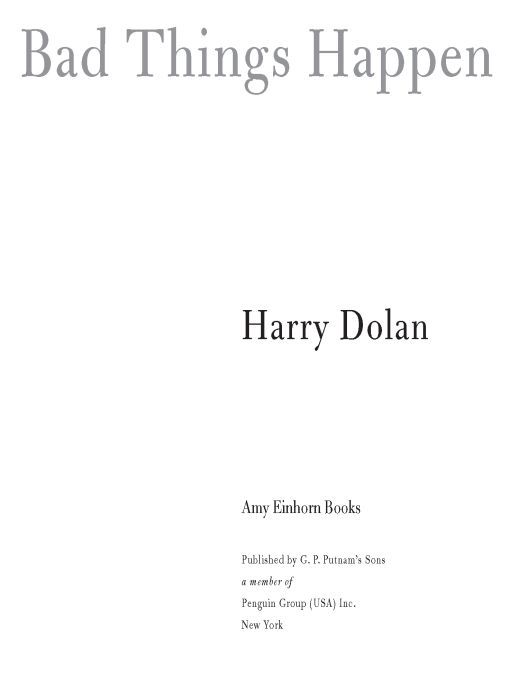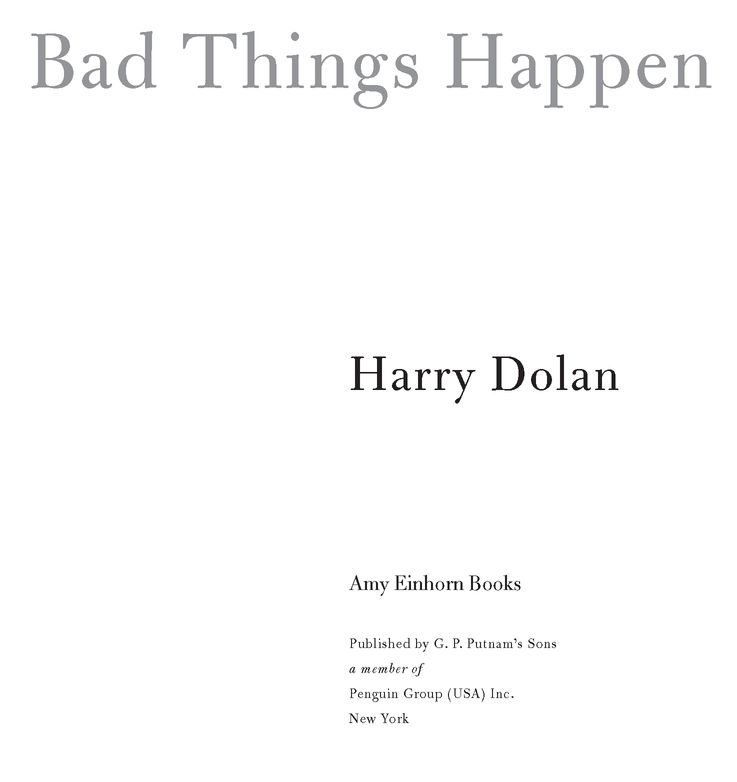Harry Dolan
Authors: Bad Things Happen
Tags: #General, #Women Detectives - Michigan, #Women Detectives, #Murder, #Mystery & Detective, #Murder - Investigation, #Michigan, #Ann Arbor (Mich.), #Fiction, #Literary, #Investigation, #Mystery Fiction, #Women Sleuths, #Periodical Editors, #Crime


Table of Contents


AMY EINHORN BOOKS
Published by G. P. Putnam’s Sons
Publishers Since 1838
Published by the Penguin Group
Published by G. P. Putnam’s Sons
Publishers Since 1838
Published by the Penguin Group
Penguin Group (USA) Inc., 375 Hudson Street, New York, New York 10014, USA • Penguin Group (Canada),
90 Eglinton Avenue East, Suite 700, Toronto, Ontario M4P 2Y3, Canada (a division of Pearson Canada Inc.)
Penguin Books Ltd, 80 Strand, London WC2R 0RL, England • Penguin Ireland, 25 St Stephen’s Green, Dublin 2, Ireland
(a division of Penguin Books Ltd) • Penguin Group (Australia), 250 Camberwell Road, Camberwell, Victoria 3124,
Australia (a division of Pearson Australia Group Pty Ltd) • Penguin Books India Pvt Ltd, 11 Community Centre,
Panchsheel Park, New Delhi-110 017, India • Penguin Group (NZ), 67 Apollo Drive, Rosedale, North Shore 0632,
New Zealand (a division of Pearson New Zealand Ltd) • Penguin Books (South Africa) (Pty) Ltd,
24 Sturdee Avenue, Rosebank, Johannesburg 2196, South Africa
90 Eglinton Avenue East, Suite 700, Toronto, Ontario M4P 2Y3, Canada (a division of Pearson Canada Inc.)
Penguin Books Ltd, 80 Strand, London WC2R 0RL, England • Penguin Ireland, 25 St Stephen’s Green, Dublin 2, Ireland
(a division of Penguin Books Ltd) • Penguin Group (Australia), 250 Camberwell Road, Camberwell, Victoria 3124,
Australia (a division of Pearson Australia Group Pty Ltd) • Penguin Books India Pvt Ltd, 11 Community Centre,
Panchsheel Park, New Delhi-110 017, India • Penguin Group (NZ), 67 Apollo Drive, Rosedale, North Shore 0632,
New Zealand (a division of Pearson New Zealand Ltd) • Penguin Books (South Africa) (Pty) Ltd,
24 Sturdee Avenue, Rosebank, Johannesburg 2196, South Africa
Penguin Books Ltd, Registered Offices: 80 Strand, London WC2R 0RL, England
All rights reserved. No part of this book may be reproduced, scanned, or distributed in any printed or electronic form
without permission. Please do not participate in or encourage piracy of copyrighted materials in violation of the
author’s rights. Purchase only authorized editions. Published simultaneously in Canada
without permission. Please do not participate in or encourage piracy of copyrighted materials in violation of the
author’s rights. Purchase only authorized editions. Published simultaneously in Canada
Library of Congress Cataloging-in-Publication Data
Dolan, Harry.
Bad things happen / Harry Dolan.
p. cm.
Bad things happen / Harry Dolan.
p. cm.
eISBN : 978-1-101-10506-1
1. Periodical editors—Fiction. 2. Women detectives—Michigan—Fiction. 3. Murder—Investigation—Fiction.
4. Ann Arbor (Mich.)—Fiction. I. Title.
PS3604.0424B
813’.6—dc22
4. Ann Arbor (Mich.)—Fiction. I. Title.
PS3604.0424B
813’.6—dc22
This is a work of fiction. Names, characters, places, and incidents either are the product of the author’s imagination or are used fictitiously, and any resemblance to actual persons, living or dead, businesses, companies, events, or locales is entirely coincidental.
While the author has made every effort to provide accurate telephone numbers and Internet addresses at the time of publication, neither the publisher nor the author assumes any responsibility for errors, or for changes that occur after publication. Further, the publisher does not have any control over and does not assume any responsibility for author or third-party websites or their content.
FOR LINDA
(She knows why.)
Chapter 1
THE SHOVEL HAS TO MEET CERTAIN REQUIREMENTS. A POINTED BLADE. A short handle, to make it maneuverable in a confined space. He finds what he needs in the gardening section of a vast department store.
He stows the shovel in his cart and moves unhurriedly through the wide aisles, gathering a few more items: D-cell batteries, a bag of potting soil, a can of weed-killer. Leather work gloves, two pairs. In the grocery section he picks up four deli sandwiches wrapped in plastic and a case of bottled water.
The checkout lanes are crowded. He chooses a line and the fluorescent lights flicker overhead as he considers how he’s going to pay. His wallet holds a credit card in the name of David Loogan. It’s not the name he was born with, but it’s what he calls himself now. He’s not going to use the credit card.
He does some calculations in his head and decides he has enough cash.
The line moves and he thinks he’ll get out quick and clean, but he’s wrong. The cashier wants to talk.
“I think I’ve seen you before,” she says to him.
“I doubt it.”
She’s tall, broad in the hips, attractive, though the stark light accentuates the lines under her eyes and around her mouth.
“You look familiar,” she says.
The man who calls himself David Loogan doesn’t want to be familiar. He wants to be nondescript. Unmemorable.
“Maybe I’ve seen you here in the store,” the cashier suggests.
He offers her a lukewarm smile. “That must be it.”
He busies himself loading things onto the counter. The cashier takes the shovel and holds it with the blade pointing skyward so she can scan the bar code on the handle.
“You must be a gardener,” she says.
He ought to agree and leave it at that, but he gets flustered. He starts to say, “I’m an editor,” but stops himself. The truth won’t do. He goes with the first lie that comes into his mind.
“I’m a juggler,” he says.
It’s a mistake. She decides to find him charming. She smiles and sets the shovel on the end of the counter and reaches for the potting soil in a leisurely way.
“You must be very good,” she says lightly. “I’ve never heard of anyone juggling shovels. But one’s not enough, is it? You ought to have three.”
Go with charming then. “I’ve already got three,” he says. “Anyone can juggle three. The real trick is juggling four.”
“It must be dazzling,” she says. “Where do you work? Kids’ birthdays?”
He waits a beat and answers in his most serious tone. “Garden parties.”
“Ha. Are you sure we haven’t met before?”
She’s flirting, Loogan decides. He looks at her fingers as she scans the sandwiches. She’s wearing a wedding ring.
“I could swear I know you,” she says. “Maybe we went to school together.”
“I never went,” he says. “Everything I know about juggling is self-taught.”
“I’m serious. I think we went to high school together.”
“I didn’t go to high school around here.”
“Well, hell, neither did I,” she says. “And it’s been quite a while. But you remind me of a boy in my class. I’ll think of your name in a second.”
She bags the gloves and the batteries together, the weed-killer separately.
“Dennis,” she says suddenly, looking up at him. “Or Daniel?”
David Loogan picks up the shovel from the counter and is troubled by a momentary vision. He sees himself stabbing the blade into the base of the cashier’s neck.
“Ted,” he tells her. “My name is Ted Carmady.”
She smiles and shakes her head. “Are you sure?”
“I’m sure.”
She lets it go with a shrug. “Well, then I was way off, wasn’t I?”
He puts the shovel in his cart, and she reads off his total and takes his money. He thinks she has turned shy on him, but she scribbles something on his receipt before she hands it over. He scans it on the way out, sees her name (
Allison
) and a phone number, and crumples the paper discreetly.
Allison
) and a phone number, and crumples the paper discreetly.
Out in the parking lot, Loogan adjusts the collar of his black leather coat and checks his watch. Nine-thirty on a Wednesday night in October. A mist of rain is falling and the cars in the lot glow in the yellow light of tall arc lamps.
The lamps reassure him. He is not exactly afraid of the dark, but he often feels uneasy going out after sunset. And parking lots unnerve him. The echo of footsteps in a parking lot at night can set his pulse racing.
Loogan moves steadily along a row of cars, pushing the shopping cart before him. He has an uncomfortable moment when he sees a figure coming toward him. A thin man with a weathered face, hollowed eyes. A hooded sweatshirt, pants torn at the knee. Right hand resting in a pocket of the sweatshirt.
Loogan is suddenly aware of the humming of the arc lamps, the turning wheels of the cart.
You’re fine, he tells himself. Nothing’s going to happen.
As the thin man gets close, his hand comes out of the pocket of his sweatshirt. Loogan sees a glint of silver. Metal, he thinks. Blade. Knife.
Reflexively he reaches out to grab the thin man’s wrist, but he stops himself in time. The thin man flinches away from him and hurries past, clutching a silver-gray cell phone to the front of his sweatshirt. He mumbles something Loogan doesn’t catch.
Then he’s gone and it’s over and Loogan comes to his car. He loads the shovel in the trunk, and the potting soil, and all the rest. He shuts the trunk and pushes the cart into an empty parking space.
The hum of the arc lamps has receded into silence. Everything is normal. David Loogan is an ordinary shopper. No one would think otherwise. He opens his car door and slides in behind the wheel. He looks nothing at all like a man heading off to dig a grave.
The man who called himself David Loogan had been living in Ann Arbor since March. He rented a small furnished house on the west side: a sharp-roofed wood-frame place with a porch in the front and a little yard in back wound about with chain-link fence.
He spent his days in the vicinity of Liberty and State streets, reading newspapers in cafés, watching movies at the Michigan Theater. He observed the comings and goings of university students, listened in on their conversations. He was not out of place in a university crowd: he might have passed for an older graduate student, or a young professor. He was thirty-eight.
The house he rented stood on the corner of a tree-lined street and belonged to a professor of history who was on sabbatical, doing research at a think tank somewhere overseas. He had left a neglected garden in the backyard, and for a few days in April Loogan tried his hand at planting flowers. He bought seeds and poked them into the dirt. He watered, he waited. The flowers showed no sign of growing.
Other books
The Orphans (Book 4): White Lie by Evans, Mike
Glacier National Park by Mike Graf
The Billionaire's Courageous Lover (Bold, Alaskan Men Book 3) by Elizabeth Lennox
A Simple Amish Christmas by Vannetta Chapman
The Banshee's Revenge (The Banshee's Embrace Trilogy) by Richards, Victoria
Collide by Christine Fonseca
Desire in Deadwood by Molly Ann Wishlade
CHARITY'S GOLD RUSH (A Strike It Rich in Montana novel) by Hickey, Cynthia
Sweet Spot (Summer Rush #1) by Cheryl Douglas
